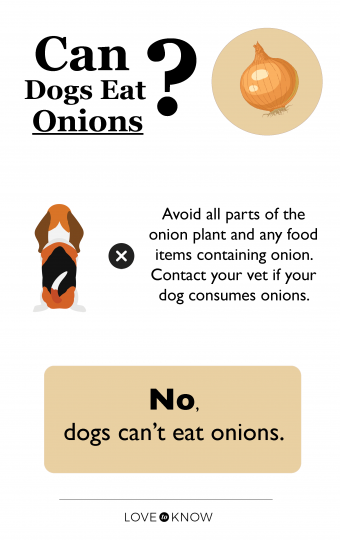
No, you shouldn't feed onions to your dogs. Though small amounts of onions are unlikely to make your dog ill, some dogs are more sensitive than others, so you should assume there is no safe amount of onions you can feed to your dog. In extreme cases, if your dog eats too many onions, they may die. Keep in mind that most dogs aren't enticed by raw, whole onions, but more appetizing foods containing chopped and cooked onion, or onion powder, present a real danger to your dog.

Onions Contain Toxic Compounds
Onions contain a toxic substance called N-propyl disulfide. This substance causes the destruction of red blood cells in dogs, resulting in anemia.
By adhering to the oxygen molecules in your dog's red blood cells, the toxin causes oxidative damage to their red blood cells. This lowers the red blood cells' ability to transport oxygen while also tricking your dog's body into believing the blood cell is an invader.
Your dog's body then begins to fight the red blood cells; a process known as hemolysis. Hemolysis can lead to hemolytic anemia if not treated. This means that your dog's red blood cells are being destroyed faster than they can be produced, resulting in serious poisoning symptoms and, in the worst-case scenario, death.
Dogs are poisoned by all parts of the onion plant, including the flesh, leaves, juice, and from processed powders. Onions and the rest of the allium family (shallots, leeks, and chives) are toxic to dogs, whether raw or cooked, fried or powdered.
Onion powder is often a larger concern than the actual onion itself, although both are dangerous due to their chemical compounds. Onion powder is more concentrated in those particular compounds than raw onion, making it a larger hazard to your dog.
That being said, a medium-sized onion is often sufficient to cause toxicity in a medium-sized dog. In the same size dog, 1/4 cup or less of onion powder could cause a severe reaction. Keep in mind, this is a medium-sized dog. It would take significantly less onion or onion powder for a small dog to exhibit symptoms.
Symptoms of Onion Toxicity
There are some dogs who can tolerate onions better than others, but regardless, it's critical to call the veterinarian if your dog has consumed onion in any amount. Although a small piece of onion being dropped on the floor and consumed by your dog often won't cause side effects, it's better to be aware and avoid consumption as much as possible. If your dog has consumed onion, making your vet aware of the issue as soon as it happens will ensure they know the background if or when symptoms begin to appear.

Symptoms of onion toxicity include:
- Lethargy
- Vomiting
- Weakness
- Decreased appetite
- Increased heart rate
- Pale gums
- Fainting
If these symptoms appear, your veterinarian will run a series of tests to make a diagnosis.
Addressing Onion Toxicity
As a dog owner, the most important thing you can do to prevent onion toxicity is to never let your dog eat onions. If your dog is experiencing toxic consequences, they will almost certainly require veterinarian care. Depending on how recently your dog ate the onions, your veterinarian may induce vomiting and provide supportive care until your dog's body can manufacture enough healthy red blood cells to replace the damaged ones. Your dog may need a blood transfusion in severe circumstances.
Reach Out to Your Vet Quickly
Toxicity from onions can be fatal. The sooner you get your dog to the veterinarian, the better their chances will be and the easier their recovery. Your best bet is to ensure you keep onions and foods that include onions out of your dog's reach.







